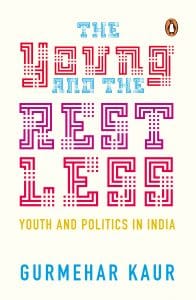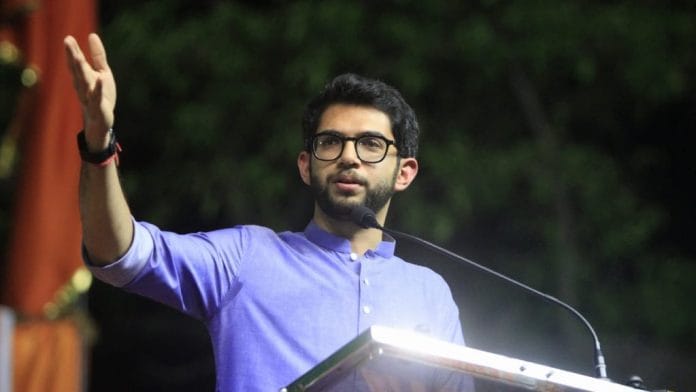You were talking about women in the party when I interrupted you, let’s talk about that for a second here,’ I shifted in my chair, moving to the edge of my seat, straightening my spine.
This was going to be a break it or make it moment, the finale of my dissection of Aaditya Thackeray’s mind that had baffled many political analysts.
‘Yes!’ he said, in a firm, sure tone, letting me know it was a conversation he was eager to have. And I was eager to know. So far so good.
‘You must have heard about the women’s reservation bill. Are you for it?’ I asked.
‘I mean, reservation is of course a larger question with two to three parts: first, why did we have to come to this point; second, whoever has got reservation, have they really benefited from it? That is another question. But if you see the BMC or Thane Municipal Corporation where we have contested elections, 50 per cent is actually the reservation for women in those seats, so that is the great thing. So the way you reserve it at times, is that sometimes a husband is active and then the wife is active and things like that, but that’s okay, it’s a political adjustment you make.
The point is that the Shiv Sena has more than 60 per cent women candidates, especially in local municipal corporations. These are women who are handling their own households and are also actively participating in the party, out in protests, or doing self-help group stuff such as making cloth bags and employing another 100 women or doing farm-to-city projects.
Also read: Shiv Sena has a new ‘tiger’, and it’s not Uddhav Thackeray
Essentially, you see the last six or seven mayors we have made, have been women, some of them because of the reservation that came but then otherwise some naturally also.’
‘So is this a Shiv Sena reservation?’
‘No, it’s for municipal corporation. See but naturally beyond that we have gone up to 67 per cent without realizing. We have kept this thing of . . . you know . . . many times I’ve been asked, elections are coming up, do you think the Yuva Sena will get a quota in the seats, and I said, “No.” I don’t think anyone should have a quota in the seats. Whoever is deserving should stand for elections and be the voice of the party; they should work and get it. So in that natural process these women have come ahead and have become powerful.’
‘As you’re saying that the women in the party have surpassed men all on their own merit, and you take a lot of pride in that, would you then go ahead and say you’re a feminist?’ I asked sweetly but with my eyebrows raised at him, almost as a challenge.
‘Depends on what kind of feminism we see it as . . .’
I cut him off before he could go on about the various ways in which people view feminism. ‘I’m talking about feminism as feminism, as women’s equality, that women are equal to men. Would you say you are a feminist?’
‘Yes, I mean, if it’s not about bashing someone else. Completely feminist. ‘Even the self-defence classes we organize, I tell the girls that I’m embarrassed that we need to hold these classes.
You know, why should girls have to learn how to hold the guy in a way to get his grip off and punch him in the face and run away? But sadly that’s the society that we are living in. But anything that happens against women in the country, we blame the girl, that she was out in the night. Even during talks about promoting nightlife, the first issue that was raised was women’s safety.
Also read: I asked Balasaheb Thackeray, “Are you a mafioso?” — and lived to tell the tale
In Mumbai, which is a safe city by and large, why are we thinking of that? Why are we raising questions that are, if not creating false questions, are creating a new monster? Women are safe. Should women’s safety even be an issue? Forget nightlife, it’s the government’s job to create spaces safer for women. It’s a society’s job to respect women, wherever they are, whatever they are wearing, wherever they go, it doesn’t matter. It shouldn’t matter to them if it’s nightlife or daylife, women should always be safe.’
‘I’m mildly surprised that you’ve been so vocal about women’s issues.’
‘You have to be, ya. You read newspapers and it’s not even women, it’s young girls—three years, eight years that we are talking about. I just read about this young girl in Kashmir, I was horrified. It’s horrible.’
He mentions the statement an MP made on the Asifa Banu case and showed his disgust at what had been happening. ‘We have been an alliance for twenty-five years and these are the things that are strikingly different about a pre-election BJP and a post-election BJP. For example, if you look at the issues we have taken up with them, we’ve been trying to tell them that we were not your enemies and that we have been with you for twenty-five years. We stood with you when no one stood with you…’
 This excerpt from The Young and The Restless has been published with permission from Penguin Random House India.
This excerpt from The Young and The Restless has been published with permission from Penguin Random House India.






